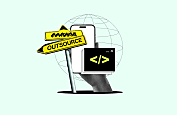
- Overview Of Python App Development: Key Statistics and Facts
- Evaluating Python for Mobile App Development: Is It Effective?
- Glancing At The Benefits Of Using Python For Mobile App Development
- The Types of Mobile Apps Developed With Python
- Understanding The Top Python Mobile App Development Frameworks
- Real-Life Examples of Mobile Applications that Use Python
- Step-By-Step Guide To Develop Mobile Apps With Python
-
Timeline for Developing a Mobile App with Python
- Conceptualization and Planning (1-2 weeks)
- Choosing the Right Framework and Setting Up (1 week)
- Design of User Interface (2-3 weeks)
- Development of Core Functionality (6-8 weeks)
- Testing and Quality Assurance (2-3 weeks)
- Deployment and Launch (1-2 weeks)
- Post-Launch Support and Maintenance (Ongoing)
- The Cost of Mobile App Development with Python
- Best Practices for Using Python in Mobile App Development
- Key Considerations for Using Python in Mobile App Development
- Developing Secure Mobile Applications with Python
- Finding the Right Development Partner with MobileAppDaily
- Parting Thoughts
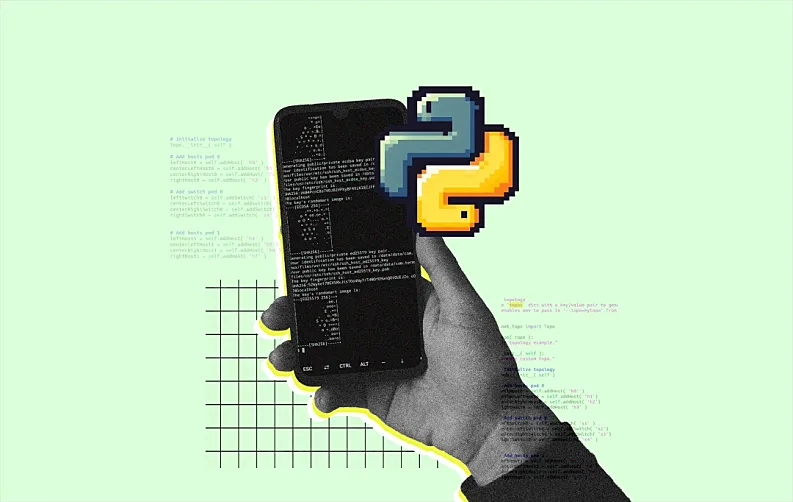
Being the most popular programming language in 2024 (TIOBE index), Python is a powerhouse in website and software development, task automation, data analysis, and more. Its versatility, along with its simplicity, readability, and vast ecosystem of libraries, make it a robust solution for a variety of projects. Python is designed for simplicity and readability, which makes it a suitable language for writing secure codes, but if you don’t know how to make an app with Python, you can always ask, “Do my Python homework” from professionals.
However, when it comes to mobile Python app development, how does it compare to other solutions like Swift, Kotlin, or JavaScript?
Python lacks native support for mobile development. However, it expands its abilities with external frameworks. Examples include Kivy and PyQt. These frameworks aid in creating mobile applications. They ensure reliability and stability in the development process.
In this guide, we’ll explore Python mobile app development, focusing on the Kivy framework for cross-platform solutions. Led by experienced developers, Kivy stands out for its innovation and reliability. We’ll compare Python’s mobile capabilities with other technologies. It will help you make informed decisions for your Python app development projects.
But let’s first take a glance at Python!
Overview Of Python App Development: Key Statistics and Facts
- The Flying Circus of Monty Python inspired the name Python!
- Python is used by ILM, the firm that produced the Star Wars franchise's VFX.
- The age range of 21 to 29 accounts for the bulk of Python users!
- Python is now the second most popular language on the internet, according to Google search statistics for 2019.
- The annual salary of a Python developer might reach $118,000.000!
- One of the official languages utilized by Google is Python!
- The package repository for Python has 147,000 packages!
Evaluating Python for Mobile App Development: Is It Effective?
Python is well-known for being simple and easy to read. However, it's not ideal for mobile app development because it's an interpreted language. Android and iOS don't directly support Python app development. But that doesn't mean you can't use it for mobile apps. Developers can overcome this limitation by using Python GUI frameworks. Two popular frameworks are Kivy and BeeWare. These frameworks bridge the gap between Python and mobile platforms. They achieve this by converting Python code into native code. This conversion allows Python apps to run smoothly on mobile devices.
GUI frameworks are crucial for translating Python's web framework into mobile applications. They bridge Python and mobile APIs, enabling interaction. This translation is vital to ensure mobile devices understand and execute Python code.
When considering making a mobile app using Python for app development that works on different platforms, you need to consider some important things for each operating system.
| Aspect | Android | iOS |
|---|---|---|
| Language Compatibility | Android primarily uses Java, so Python code needs conversion to Java. | Development for iOS requires a macOS device. |
| Compilation Process |
|
|
Glancing At The Benefits Of Using Python For Mobile App Development
Python is highly valued in mobile app development for its versatility. Learning Python is easy, making it accessible. Python offers a vast ecosystem of libraries and frameworks. Using Python for mobile apps has several advantages. These advantages can boost development efficiency. They also enhance app performance significantly. Here's a deeper look at some of the key benefits of using Python app development:
Rapid Development Cycle
Python is known for its concise and easy-to-read code. This speeds up Python app development. Fewer lines of code are needed compared to other languages. This makes development faster. It also makes maintenance and updates simpler. Python's simplicity aids in quick prototyping. Developers can test ideas faster, and applications can be built more quickly. This is compared to many other languages.
Rich Ecosystem and Libraries
Python offers a vast array of libraries and frameworks. They simplify tasks that would otherwise need extensive custom coding. For mobile app development, libraries like Kivy and PyQt, and frameworks like Django and Flask, come in handy. They provide pre-built components for UI design and database management. This abundance of resources allows developers to concentrate on core functionality. They don't have to get bogged down in platform intricacies.
Cross-platform Compatibility
One of Python’s most significant advantages is its ability to run on multiple platforms. Frameworks such as Kivy and BeeWare let developers write code once. They can then use it on various operating systems. These include Android and iOS. This cross-platform feature helps developers. They can reach more people. Moreover, they don't need to spend extra time or money. They don't have to rewrite code for different platforms.
Community Support
Python for app development has one of the most active programming communities. It's an invaluable resource for developers. They can turn to forums, social media groups, or official documentation for support. Whether encountering a bug, looking for specific advice, or exploring new technologies. This vibrant community contributes to a continuous stream of new tools and updated libraries. It ensures that Python remains at the cutting edge of technology trends.
Integration Capabilities
Python is great for projects needing integration with other languages and tools. It works well with C, C++, and Java. Python application development allows for performance optimizations when needed. Additionally, it's compatible with popular data exchange and API technologies. This makes it a strong choice for backend development in mobile apps.
Scalability
Python is versatile and adapts to different sizes of projects. It's trusted by major tech firms for its reliability. These qualities make Python ideal for expanding mobile apps. They can handle increasing user activity and data loads effectively.
Also read: A basic tutorial to Enumerate in Python
The Types of Mobile Apps Developed With Python
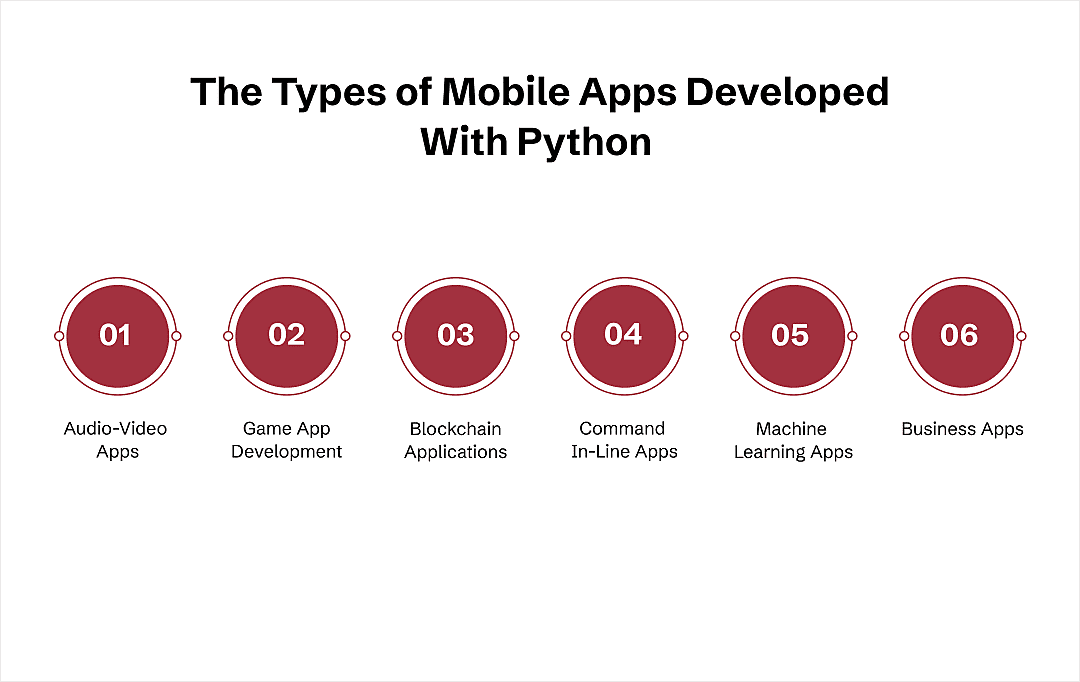
Python is a great choice for mobile app development. It's adaptable and versatile. Developers benefit from its rich libraries and frameworks. They can create apps in various domains. Python's readability and simplicity are key advantages. These features enable effective Python application development. Here’s a closer look at the types of mobile apps that can be developed using Python:
Audio-Video Apps
Python is a powerful tool for creating multimedia applications. It includes music and video streaming apps. Libraries like OpenCV and PyDub help handle multimedia content. They let developers process and integrate audio and video seamlessly. This capability makes Python ideal for developing sophisticated audio editing apps. These apps require robust back-end processing.
Game App Development
Python plays a significant role in gaming. It's evident in games like "Battlefield 2" and "EVE Online." These gaming apps utilize Python for various gameplay elements and add-ons. Python's strength lies in enabling rapid prototyping and testing of game concepts. It achieves this through libraries like Pygame. Moreover, Python application development contributes to developing game design tools. These tools facilitate crucial aspects like level design and narrative branching. Such features are essential for creating engaging gaming experiences.
Blockchain Applications
Blockchain technology is complex, but Python simplifies its application development. Python's syntax is simple. Frameworks like Flask enhance blockchain network management. Python handles HTTP requests efficiently. It runs scripts across distributed networks seamlessly. This makes Python ideal for decentralized application development.
Command-line Apps
Python excels in creating command-line applications, which operate through a text-based interface. Python's REPL (Real-Eval-Print-Loop) feature allows developers to test and debug interactively. Various libraries are available to support the development process. These libraries enable the creation of highly functional command-line tools. Such tools with Python for app development can perform diverse tasks efficiently. They don't require a graphical user interface to operate effectively.
Machine Learning Apps
Machine learning is another area where Python shines. Pandas and Scikit-Learn are libraries for developers. They help implement machine learning frameworks and algorithms. These tools are effective for developers. Python becomes cost-effective due to these libraries. They're available under open-source licenses. Python has become a solution for intelligent system development. These systems handle data analysis and predictive modeling.
Business Apps
Python's flexibility is apparent in business applications. These include e-commerce and enterprise resource planning (ERP). ERP softwares and frameworks such as Odoo and Tryton provide comprehensive business management tools. These tools cover inventory management, accounting, and more. They are all developed using Python. This wide applicability makes application development in Python a strategic choice for companies. They seek to improve operational efficiencies through tailored software solutions.
Understanding The Top Python Mobile App Development Frameworks
Python is a versatile programming language. It's favored for its clear syntax and readability. This extends into mobile app development trends. Various robust frameworks facilitate this process. These frameworks are designed to simplify and enhance. They make building mobile applications easier. They work across different platforms. Let's delve into some top application development in Python frameworks. They help developers create innovative mobile applications.
Kivy
Kivy is an open-source Python library designed for developing multitouch applications. Kivy is designed for Android and iOS, offering a natural user interface. It supports multitouch gestures and is highly adaptable. The Kv language distinguishes Kivy, separating logic and layout for clarity. This enhances readability and ease of maintenance for developers. Kivy provides a diverse range of widgets for developers. Additionally, it boasts GPU acceleration for high-performance graphics. This feature ensures smooth and efficient rendering. Consequently, Kivy is favored by developers seeking innovation in Python applications.
BeeWare
BeeWare is a significant Python framework. It allows developers to write native applications in Python. They can deploy these apps on multiple platforms. Platforms include macOS, Windows, Linux, iOS, and Python android app development. BeeWare utilizes a set of tools and libraries. These tools enable the creation of platform-native GUIs. Developers can achieve this using Python code. The framework aims to facilitate app development. It helps developers write their apps once. Then, they can deploy it everywhere. This includes both desktop and mobile platforms. BeeWare simplifies the development process. It does so by maintaining a single codebase. This speeds up development time. Also, building an app with Python reduces maintenance costs.
PyQt
PyQt brings the Qt application framework to Python. It allows the creation of functional mobile apps. These apps are visually appealing. PyQt provides strong widget support. Widgets are crucial for mobile development. They enhance the user interface. PyQt supports OpenGL. It integrates with various databases. This integration boosts its power. PyQt is favored for cross-platform development. Developers prefer its native look. It suits complex applications well. It's useful for 3D graphics and intensive data processing.
Flask
Flask is primarily known as a web framework. However, it's also utilized in mobile app development for backend services. Developers can establish RESTful web services using Flask. These services allow communication with mobile apps via HTTP requests. Flask's design is both lightweight and modular. This design contributes to its high scalability. This scalability is particularly beneficial for mobile apps. They often need to handle varying loads efficiently. Flask's simplicity is another advantage. It enables developers to set up backend services with minimal effort. This simplicity makes Flask perfect for building an app with Python projects with tight deadlines. It's also ideal for those requiring rapid prototyping.
Django
Django is a widely used framework. It's often linked with web development. However, it's also useful for mobile apps, especially those needing strong backend support. Django promotes rapid development and clean, pragmatic design. This framework offers numerous built-in features. For example, strong authentication and messaging are included. These features are often necessary in mobile applications. Django serves as a robust solution for demanding apps. Especially those requiring substantial server-side processing. It can handle extensive data interactions efficiently. Additionally, it manages user-specific content effectively.
Real-Life Examples of Mobile Applications that Use Python
| Application | Usage Of Python | Key Features |
|---|---|---|
| Backend management with Django | High scalability for daily active users | |
| Content management with Django | Efficient handling of user-generated content | |
| Disqus | Comment system management with Django | Security features, user engagement tools |
| Spotify | Backend services for data analysis | Personalized music recommendations |
| Backend services for content and user management | Large scale user interaction handling | |
| Dropbox | Backend services for data handling | File storage and synchronization across devices |
| Uber | Backend services for dynamic pricing and geolocation | Real-time data processing for ride matching and pricing |
Python's flexibility and robustness make it a top choice for mobile app development. Many successful mobile applications are built with Python. Let's delve into some standout examples. We'll explore their unique features and how they utilize Python:
Instagram is one of the most popular social media platforms worldwide. It's a prime example of Python's scalability in mobile apps. Python helps Instagram manage over 400 million daily active users. It handles vast volumes of data and interactions seamlessly. Instagram's backend relies on Django for support. Django powers its complex functionalities smoothly. These include image uploading and data storage. Also, it manages real-time notifications effectively. Python proves its ability to handle high traffic. It's adept at data-intensive operations as well.
Pinterest, ranked third among social networks, relies on Python. Python facilitates image discovery, saving, and sharing for users. The platform utilizes Django for managing user-generated content. Django ensures efficient handling of large content volumes. Python’s clear syntax is beneficial for Pinterest. It boasts apps like Pinterest to maintain reliability. Pinterest can support millions of users due to Python. Users can store and share their collections effectively.
Disqus
Disqus revolutionizes comment management across websites by facilitating dynamic discussions. Disqus employs Python and Django for security, moderation, and engagement. These tools ensure robust security measures. They also facilitate efficient comment moderation. Furthermore, they provide various user engagement features. Python's flexibility accommodates multiple authentication options. It seamlessly integrates with diverse databases. This quality makes Python ideal for managing user interactions. Particularly, it suits Disqus's extensive user base.
Spotify
Spotify, the top music streaming service, relies on Python for backend tasks. It uses Python mainly for recommendation algorithms, ensuring personalized experiences. Python's efficiency in handling complex data enables Spotify to offer features like Radio and Discover. These features adapt to user preferences, showcasing Python's scalability.
Reddit uses Python for backend operations on its mobile and web platforms. Python manages content and user services effectively. It handles data and user authentication efficiently. This supports Reddit's large user base and interactions. Choosing Python enables Reddit apps to scale smoothly. It ensures a responsive and user-friendly interface.
Dropbox
Dropbox utilizes Python in its mobile and desktop apps. Python plays a vital role in managing Dropbox's data. It ensures smooth access to files on various devices. Python handles complex data structures efficiently. Due to its memory management, it's suitable for Dropbox's backend.
Uber
Uber, one of the top ride sharing apps, relies heavily on Python. It's especially evident in its surge pricing algorithm. Python excels in real-time data processing and geolocation. This language effectively handles dynamic pricing models. It efficiently matches drivers with riders. This efficiency is crucial for Uber's global operations.
Step-By-Step Guide To Develop Mobile Apps With Python
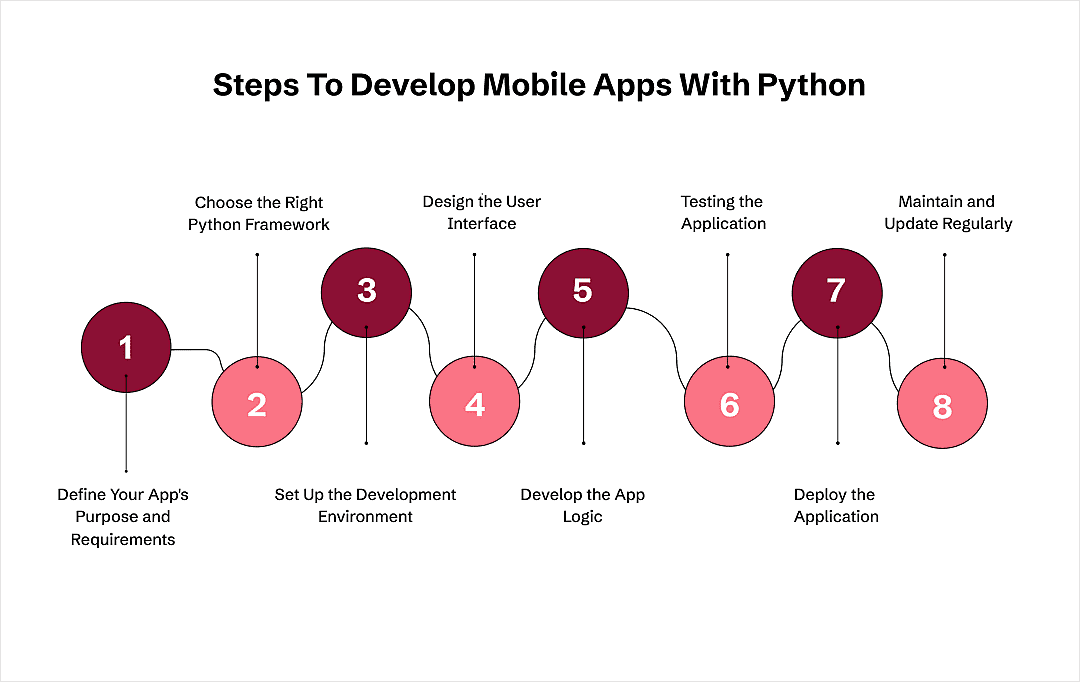
Creating mobile applications using Python follows systematic steps. These steps utilize Python's libraries and frameworks. Python's libraries and frameworks are powerful tools. They aid in the development of mobile applications. Here's a detailed guide to each phase of the mobile app development process using Python:
Define Your App's Purpose and Requirements
Start by clearly defining the purpose of your mobile app. Understand the needs of your target audience and specify the core functionalities you wish to include. This step is crucial for determining the scope of the project and guiding the subsequent phases of development.
Choose the Right Python Framework
Choose the Python framework based on app type and needs. For instance, Kivy suits multitouch apps. BeeWare is good for cross-platform native apps on Android and iOS. It's important to match framework with app requirements. Kivy offers great support for multitouch features. BeeWare allows writing native apps for Android and iOS. These frameworks cater to different application needs. So, make a decision based on specific requirements. PyQt can be used for more complex applications that require a robust user interface.
Set Up the Development Environment
Install Python and the chosen framework on your development machine. When you develop a mobile app, certain tools become necessary. One such tool is an IDE. IDE stands for Integrated Development Environment. It helps in coding. Specifically, you might need one supporting Python android app development. Android Studio is essential for compiling the Android app. Similarly, for Python iOS app development, Xcode is necessary. These tools aid in development and ensure smooth functioning.
Design the User Interface
Designing the user interface is a critical step. Use the tools and widgets from your Python framework. Create an interface that works well and looks good. Make sure it's easy to use and looks nice. Think about how people will navigate it and keep things consistent and accessible.
Develop the App Logic
Start coding the main functionalities of your app using Python. Setting up the database is the first step. Then, integrate APIs into your application. You also need to write the backend logic. This logic will run your application smoothly. Python libraries are helpful for specific tasks. For example, image processing tasks are made easier. Data encryption is another task they can handle. Network communication is also manageable with Python libraries. These libraries simplify complex tasks.
Testing the Application
Test your app thoroughly to identify any bugs or issues in both the frontend and back end. You can use Python’s unittest library for writing test cases. Ensure the app works seamlessly across different devices and meets all user requirements. Adjust the UI and functionality based on the feedback.
Deploy the Application
Once your app passes all tests, prepare it for deployment. To package your Python app for mobile, use tools like PyInstaller. These tools help adapt your app to different mobile operating systems. Follow guidelines from app stores like Google Play or Apple App Store. They outline the steps to submit your app for review. Once reviewed, your app can be released on these platforms.
Maintain and Update Regularly
After deployment, continuously monitor the app for any user feedback or issues. Regular updates are crucial to keep the app relevant and functional. Implement new features based on user demand. Update the app to accommodate changes in mobile operating systems or third-party services.
Timeline for Developing a Mobile App with Python
Developing a mobile app with Python has multiple phases. Each phase has specific tasks and time needs. The timeline varies based on app complexity, team experience, and project requirements. Here's a detailed breakdown of the development process stages. We'll provide an estimated timeline for each stage.
Conceptualization and Planning (1-2 weeks)
During the initial stage, we define the app’s concept. We identify the target audience and key functionalities. Stakeholders and developers collaborate to outline project requirements. They create initial wireframes and establish project scope. Milestones are set to guide the project.
| Phase | Duration |
|---|---|
| Conceptualization and Planning | 1-2 weeks |
| Setup and Framework Selection | 1 week |
| User Interface Design | 2-3 weeks |
| Core Functionality Development | 6-8 weeks |
| Testing and Quality Assurance | 2-3 weeks |
| Deployment and Launch | 1-2 weeks |
| Post-Launch Support | Ongoing |
Choosing the Right Framework and Setting Up (1 week)
Choosing the right Python framework matters. Examples include Kivy, BeeWare, or PyQt. The choice hinges on the app's needs. This decision-making process is crucial. During this phase, you set up the development environment. This includes gathering all necessary tools. Also, it involves collecting essential libraries.
Design of User Interface (2-3 weeks)
The design phase focuses on creating a user-friendly and visually appealing interface. Designers will create UI mockups, which will be detailed. They'll also design interactive prototypes. These prototypes help visualize the app flow. They also show user interactions.
Development of Core Functionality (6-8 weeks)
This is the most time-consuming phase, where the main features of the app are developed. Developers write the code for the app’s backend and frontend, integrate APIs, and ensure that the app’s logic is functional and efficient.
Testing and Quality Assurance (2-3 weeks)
Rigorous testing is essential to ensure the app is free from bugs and meets all functional requirements. This phase includes unit testing, integration testing, and user acceptance testing (UAT) to validate all aspects of the app.
Deployment and Launch (1-2 weeks)
Preparing the app for launch involves final optimizations. It also includes setting up the deployment environment. Afterward, the app gets packaged. Then, it's submitted to app stores for approval. The duration of approval can vary depending on the platform.
Post-Launch Support and Maintenance (Ongoing)
After launch, the app requires ongoing maintenance. This maintenance aims to fix any emerging issues. Additionally, it updates content and improves features. These updates are based on user feedback. This phase is ongoing as long as the app is in use.
The Cost of Mobile App Development with Python
Mobile app development using Python has become popular. This is because Python is simple and readable. It also offers robust frameworks like Kivy and BeeWare. The cost of developing a Python mobile app varies. It depends on factors such as app complexity. It also depends on the number of features. Additionally, the platforms targeted affect cost. These platforms could be iOS, Android, or both. The expertise of the development team matters too.
| App Complexity | App Examples | Estimated Cost Range | Development Time |
|---|---|---|---|
| Simple | Note-taking app, calculator | $5,000 - $20,000 | Few Weeks |
| Moderate Complexity | E-commerce app, social media app | $20,000 - $50,000 | Several months |
| Complex | On-demand service app, advanced games | $50,000 - $150,000+ | Six months to a year |
Simple Apps
Simple mobile apps with basic functionality, such as a note-taking app or a simple calculator, are the least expensive to develop. These apps typically require minimal back-end services and have a limited number of screens and features. The development of such apps can range from $5,000 to $20,000. The lower cost is due to the reduced complexity and shorter development time, which can be as little as a few weeks.
Moderate Complexity Apps
Apps with moderate complexity, like e-commerce or social media, cost more. They need integration with third-party services. These apps require user authentication and data storage. Also, they include real-time data updates. Additionally, they feature a sophisticated user interface. The cost for developing moderately complex apps ranges from $20,000 to $50,000. The higher cost is due to the longer development time, usually lasting several months. This extended period necessitates a more skilled development team.
Complex Apps
Developing highly complex apps is costly. Examples include on-demand service apps, advanced gaming apps, and those with real-time features. These apps need advanced functionalities. These include GPS integration, real-time notifications, and complex databases. Sometimes, they might even require AI integration. The development cost for such apps can range from $50,000 to $150,000 or more. Creating these apps involves a thorough process. It typically spans six months to a year. It demands a skilled and seasoned team. This team must possess specialized expertise.
Factors Influencing Cost
- Features and Functionality: The more features an app has, the higher the cost.
- Design Complexity: Advanced UI/UX designs increase development time and cost.
- Platform: Developing for both Python iOS app development and Android typically costs more than developing for just one platform.
- Development Team: Costs vary based on the location and expertise of the developers. Hiring a US-based team is generally more expensive than hiring a team from Eastern Europe or Asia.
- Maintenance and Updates: Ongoing costs for app updates and maintenance can add to the overall expense.
Best Practices for Using Python in Mobile App Development
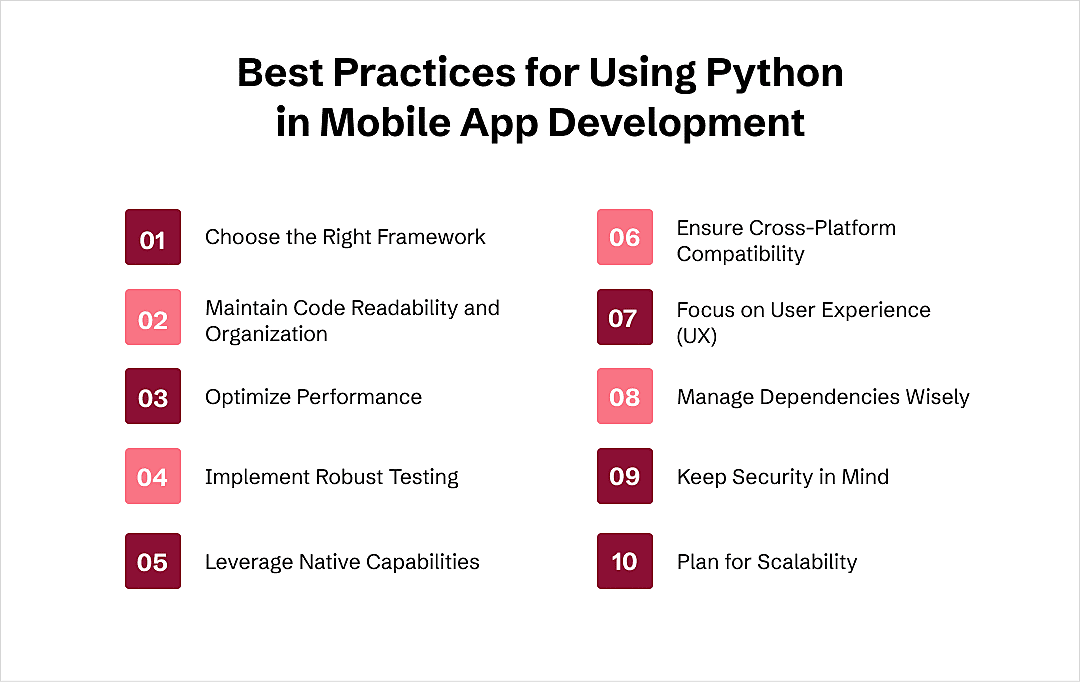
Leveraging Python for mobile app development offers numerous benefits. Its readability, simplicity, and powerful frameworks enhance efficiency. However, achieving a smooth Python cross platform app development process requires adherence to best practices. This ensures the final product is robust and efficient. Here are some detailed recommendations:
1. Choose the Right Framework
When developing mobile apps with Python, selecting the appropriate framework is crucial. Two popular frameworks are Kivy and BeeWare. Kivy is renowned for its versatility. It supports multi-touch events, making it ideal for intricate graphical applications. BeeWare, however, provides native GUI widgets. It can be preferable for applications desiring a native appearance. Assess your app’s requirements and choose the framework that aligns best with your goals.
2. Maintain Code Readability and Organization
Python is renowned for its readable and clean syntax. To make the most of this advantage, organize your code well. Follow the PEP 8 style guide for consistency. Choose clear variable and function names. Divide your code into logical modules and packages. This approach enhances understanding and maintenance. It also fosters collaboration among team members.
3. Optimize Performance
Mobile devices have limited resources compared to desktops. Therefore, performance optimization is essential. Use efficient algorithms and data structures, and avoid unnecessary computations. Profiling tools like cProfile can help identify performance bottlenecks. To ensure your app runs smoothly, we'll use pre-existing tools and make sure the database searches are as efficient as possible
4. Implement Robust Testing
Testing is a critical part of mobile app development. Implement unit tests, integration tests, and UI tests to ensure all aspects of your app function correctly. Frameworks like unittest, pytest, and Kivy’s own testing tools can be very useful. Automated testing helps catch bugs early and improves the reliability of the app.
5. Leverage Native Capabilities
Python frameworks for mobile development are robust. Sometimes, you need native features like camera. Other times, GPS or notifications are necessary. These features enhance app functionality. They make apps more user-friendly. Accessing native features can be challenging. Yet, it's essential for certain applications. Use tools like PyJNIus (for Kivy) or Rubicon (for BeeWare) to bridge Python with native APIs. This approach ensures your app can utilize all the functionalities provided by the mobile platform.
6. Ensure Cross-Platform Compatibility
One of the strengths of using Python is the ability to develop cross-platform apps. However, subtle differences between platforms (iOS and Android) can cause issues. Test your app thoroughly on all target platforms to ensure consistent behavior and appearance. Use platform-specific adaptations sparingly and only when necessary to provide a native experience.
7. Focus on User Experience (UX)
A great user experience is crucial for the success of any mobile app. Pay attention to the design and responsiveness of your app. Ensure that the UI is intuitive and the navigation is smooth. Use responsive design principles to make sure the app works well on various screen sizes and orientations. Collect user feedback and iterate on the design to continually improve the UX.
8. Manage Dependencies Wisely
To keep your application secure and current, it's important to regularly update its dependencies. This means keeping track of the software your app relies on and making sure it's always up-to-date. Use tools to create isolated environments for your projects. To keep your application secure and current, it's important to regularly update its dependencies. This means keeping track of the software your app relies on and making sure it's always up-to-date. Additionally, you should monitor for any security vulnerabilities that might arise.
9. Keep Security in Mind
Security should be a priority in mobile app development. Secure coding practices safeguard user data. They prevent vulnerabilities like SQL injection. Additionally, they address threats such as cross-site scripting (XSS). These practices ensure the protection of sensitive information. By employing them, developers enhance the security of their applications. Employ encryption for sensitive data, especially when stored or transmitted. Regularly review and update your security measures to stay ahead of potential threats.
10. Plan for Scalability
As your app grows, it should be able to handle increased load and complexity. Design your architecture with scalability in mind. Use cloud services and scalable databases to manage backend services. Implement caching strategies. Implement load balancing. This ensures your app stays fast. Even when many people use it.
Key Considerations for Using Python in Mobile App Development
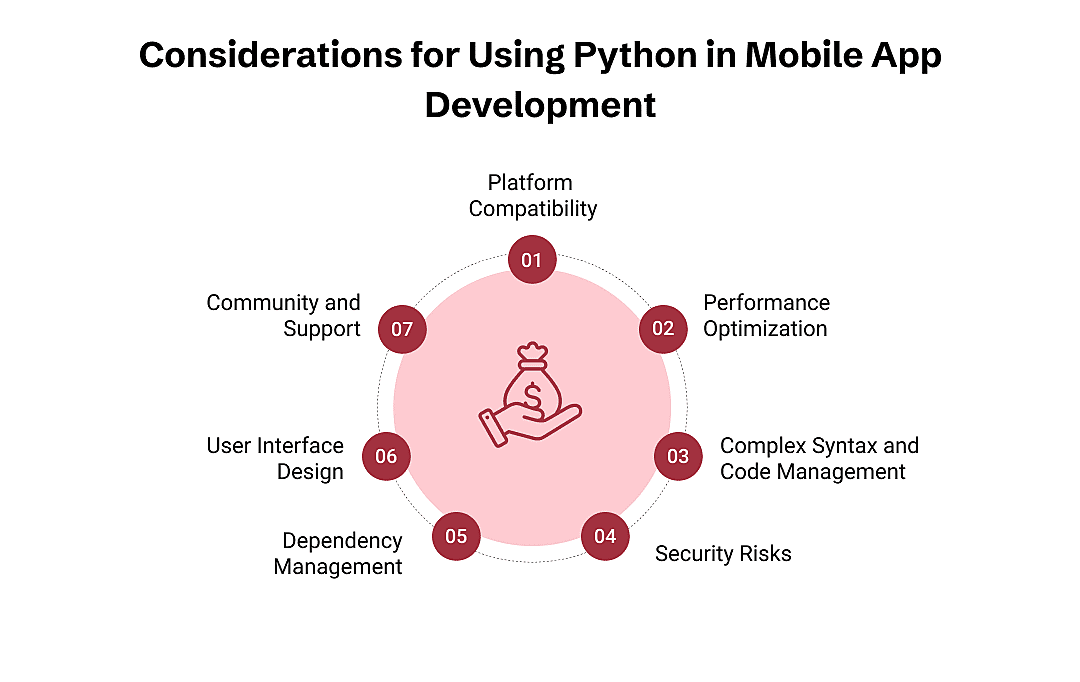
Embarking on mobile app development with Python requires considering key factors. These factors include technical, operational, and security aspects. They greatly influence the development process and final product's success. Paying attention to them ensures a smoother project execution. Technical considerations involve the app's functionality and performance. Operational aspects focus on user experience and app usability. Security measures are vital to protect user data and prevent breaches. All these factors contribute to a successful mobile app development journey.
Platform Compatibility
Platform compatibility is crucial for Python mobile app development. Python offers frameworks like Kivy and BeeWare, aiding cross-platform development. Yet, challenges exist. Apps must function consistently across iOS and Android. Testing thoroughly and making adjustments are necessary. Cross-platform frameworks may not perfectly replicate native features. This can impact user experience. Developers must manage these differences carefully. Testing on all platforms is essential. The goal is a seamless user experience across platforms.
Performance Optimization
Python is an interpreted language. It may have performance overhead. Compared to Swift or Kotlin, it's slower. Swift is for iOS, and Kotlin is for Android. This difference can be problematic. Especially for resource-intensive apps like games or real-time data apps. Developers need to optimize performance. By using efficient algorithms. And reducing memory consumption. Also, leveraging native code. Especially for performance-critical sections. Tools like Cython can also be used to compile Python code into C, improving execution speed.
Complex Syntax and Code Management
Python is known for its simplicity and readability. However, creating mobile apps can be tricky. Syntax and code management have become complex, especially with scalability. As projects grow, maintaining a clean and manageable codebase becomes crucial. Developers must adopt best practices for code organization, modularization, and documentation. To manage complexity and maintain code quality, utilize design patterns. Adhere to coding standards consistently. Conduct regular code reviews throughout the app's lifecycle. These practices ensure robustness and sustainability. By following these guidelines, developers enhance code manageability. Thus fostering long-term maintenance and scalability.
Security Risks
Security is a paramount concern in mobile app development. Python, like any other language, can have security vulnerabilities if not managed properly. It's crucial to follow secure coding practices. This protects user data and prevents common issues like SQL injection. Also, it guards against cross-site scripting and insecure data storage. Developers must encrypt data at rest and in transit. Additionally, they should implement authentication and authorization properly. Regularly updating dependencies helps mitigate security risks. Conducting security audits and penetration testing is important too. These steps identify and address potential vulnerabilities effectively.
Dependency Management
Mobile apps often rely on various external libraries and frameworks. Managing these dependencies effectively is crucial to avoid conflicts and ensure compatibility. Tools such as pip and virtual environments can assist in isolating dependencies. They also aid in efficiently managing these dependencies. Developers need to stay vigilant. It's important to keep libraries up-to-date. Additionally, monitoring for security vulnerabilities is crucial. These vulnerabilities might arise in third-party packages. By doing so, developers can ensure the stability and security of their projects.
User Interface Design
Creating a compelling and intuitive user interface (UI) is crucial for mobile app success. Python frameworks offer UI development tools. Achieving a truly native look can be tough. Developers must follow design guidelines for iOS and Android. This ensures the app meets user expectations. Investing time in crafting a responsive UI pays off. It enhances user satisfaction and engagement.
Community and Support
The Python community offers abundant resources, libraries, and frameworks. However, for mobile app development, support might be limited. Developers may need to explore niche forums and contribute to open-source projects. They might even create custom solutions for specific challenges.
Developing Secure Mobile Applications with Python
Today, mobile applications are vital in our daily lives. They handle sensitive user data and tasks. With the increasing demand for mobile app development, ensuring security is crucial. Python is a preferred language for building secure mobile apps. Its flexibility and power make it ideal choice.
Securing the Development Process with Python
The first step in building secure mobile applications with Python is ensuring the development process safety. This includes adopting safe coding practices. It also involves conducting regular code reviews. Furthermore, integrating security testing throughout the software development lifecycle is crucial.
Safe Coding Practices
Python's simplicity and readability make it conducive to writing secure code. Developers must follow certain rules to keep their software safe. One rule is input validation. This means checking data for errors or malicious content. Another rule is proper error handling. This ensures that errors are managed effectively. Also, developers should use secure libraries and frameworks. These tools help prevent common security problems. For example, SQL injection attacks and cross-site scripting (XSS).
Code Reviews
Regular manual code reviews are important. They help identify security vulnerabilities early. Automated tools like Bandit supplement these reviews. They make the process more efficient. By using both methods together, developers can address issues effectively. This approach ensures better security in the development process.
Security Testing
Ensuring security in testing is crucial. It involves static and dynamic application security testing (SAST and DAST). These tests help detect bugs early. Early detection leads to quicker resolution. This enhances the app's robustness and security.
Python Promotes Safe Software Interdependencies.
Effective management of software dependencies is crucial for securing mobile applications. Using Python's package manager, pip, developers can enhance security practices. They can conduct dependency scanning to identify potential vulnerabilities. Additionally, they can employ dependency pinning for version control. Secure dependency management ensures mitigating potential security risks effectively.
Dependency Scanning
Regularly checking project dependencies for vulnerabilities using tools is crucial. It helps in reducing security risks effectively. These tools continuously scan the dependencies for known vulnerabilities.
Dependency Pinning
Pinning project dependencies is crucial. It avoids unintended updates. These updates may introduce security vulnerabilities.
Secure Dependency Management
Ensuring the mobile app's integrity involves reviewing and updating dependencies. These dependencies come from trusted sources. Establishing a secure process is essential. It guarantees the reliability of these updates.
Python Supports Secure Data Storage and Transmission
Protecting user-sensitive data is paramount in developing secure mobile applications. Python provides tools and libraries. They ensure secure data storage. Additionally, they enhance data transmission. These tools bolster the overall security of the application.
Secure Data Storage
Using Python's frameworks and cryptography modules ensures secure storage of user credentials. These modules employ techniques like salting and hashing. For more extensive data protection, advanced tools such as SQLAlchemy come into play. SQLAlchemy offers encryption at the database level. This feature safeguards various types of stored data effectively.
Secure Data Transmission
Python's requests library, helps with secure HTTPS connections. It combines with the SSL module. This combination enables Transport Layer Security (TLS) protocols. TLS ensures secure data transmission.
API Security
To ensure security for mobile apps, use robust authentication like JWT. Flask-JWT-Extended and Django REST Framework offer such solutions. They implement strong authentication and authorization mechanisms.
Python Offers Mobile App Hardening and Runtime Protection
Python-based tools and libraries help developers strengthen mobile applications. They also offer runtime protection against possible attacks.
App Hardening
PyInstaller and Nuitka are tools for packing Python mobile apps into executables. The tools are used by every Python app development company. They obscure the code, making it tough for attackers. This prevents exploitation or reverse-engineering attempts.
Runtime Protection
Libraries like Blinker facilitate the implementation of anti-debugging measures. They also enhance control flow integrity (CFI) during runtime. These features increase the app's resilience against attacks.
Secure Deployment and Monitoring with Python
Ensuring secure deployment and continuous monitoring is crucial. It helps maintain the security of mobile applications over time. Each stage of deployment must be handled with care. Regular monitoring detects and addresses potential security threats. This approach ensures the application remains safe and reliable. Security should be a continuous priority throughout the application's lifecycle.
Deployment of Security Measures
Signing codes using cryptographic modules ensures the integrity of mobile apps during distribution. Cryptographic modules like Cryptography or pyOpenSSL can be used. These tools verify that the code has not been tampered with. Proper management of certificates further enhances deployment security.
Continuous Monitoring
Implementing logging systems and monitoring tools enhances security. Tools like the Elastic Stack and Sentry are essential. They enable real-time detection and response to security incidents. This ensures the overall safety of the mobile app environment.
Finding the Right Development Partner with MobileAppDaily
Developing a successful mobile app, especially with Python, requires the right expertise. You also need the right resources. MobileAppDaily is an invaluable resource for finding top mobile app developers. It helps you connect with companies that meet high standards of quality and reliability. This ensures you find a reliable and high-quality partner for your project.
Here's how MobileAppDaily can support your Python mobile app development journey:
- Expertise: MobileAppDaily’s listed companies have deep knowledge of Python mobile app development. They excel in strategies, design, and technology. This ensures your project is in capable hands.
- Tailored Solutions: Find a development partner whose strengths align with your app project. Ensure they provide customized solutions tailored to your specific needs. Look for expertise in Python to match your project's requirements.
- Reputation and Transparency: MobileAppDaily’s selection process guarantees you work with trustworthy companies. This ensures a smooth and reliable development process.
Visit the list of mobile app development companies and explore the best firms. Find the ideal partner for your Python mobile app project.
Parting Thoughts
In conclusion, Python stands out for mobile app development due to its versatility. It's suitable for various projects, offering simplicity, readability, and a rich ecosystem. These qualities make it appealing to developers. They can efficiently build cross-platform mobile applications. Despite not being the fastest language, Python compensates. It offers performance optimizations and integration capabilities. These ensure the creation of high-quality, performant apps. Developers can target both iOS and Android platforms effectively.
Moreover, Python prioritizes security and has strong libraries and practices. This makes it great for secure mobile apps. Following safe coding practices is key, and managing dependencies well is crucial. Also, secure data storage matters and secure data transmission techniques are important. Developers can mitigate security risks and protect user data effectively.
Python isn't the sole choice for mobile app development. Its simplicity, flexibility, and security make it appealing. Developers seek to craft innovative and secure mobile experiences. This is for users globally. Python's blend of features sets it apart.
Frequently Asked Questions
-
Are there any limitations to using Python for mobile app development?
-
Can Python be used for mobile app development?
-
Can Python programming language be a good choice for enterprise apps?
-
Is Python good for app development?
-
What are some Python applications examples?
-
What are the advantages of using Python for mobile app development?
-
What framework should you choose to build apps using Python?
-
What services does a Python app development company offer?
-
What types of mobile apps are best suited for development with Python?

Sr. Content Strategist
Meet Manish Chandra Srivastava, the Strategic Content Architect & Marketing Guru who turns brands into legends. Armed with a Masters in Mass Communication (2015-17), Manish has dazzled giants like Collegedunia, Embibe, and Archies. His work is spotlighted on Hackernoon, Gamasutra, and Elearning Industry.
Beyond the writer’s block, Manish is often found distracted by movies, video games, AI, and other such nerdy stuff. But the point remains, If you need your brand to shine, Manish is who you need.













